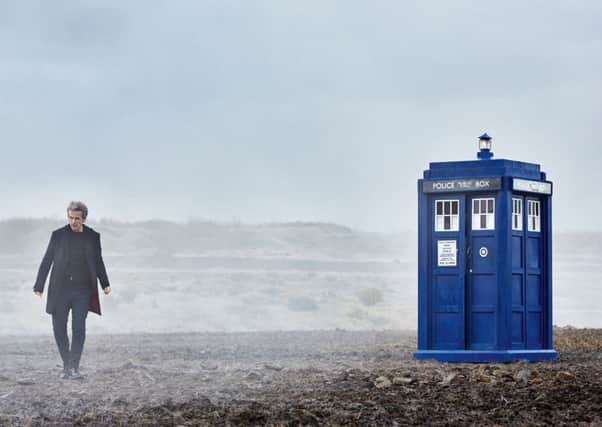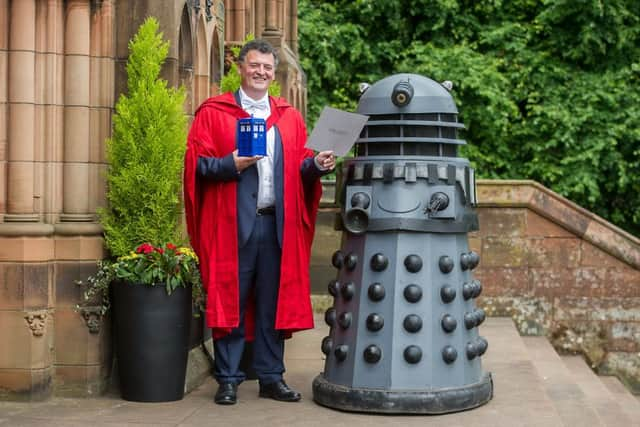Steven Moffat interview: Whoever new Doctor Who is will be fine by me


For Steven Moffat, lead writer and showrunner of the sci-fi blockbuster for eight years, however, it’s a question he is happy to leave to his successor. “The new Doctor has to be written by Chris Chibnall, not me. Whatever he does is just fine by me,” says the Scottish screenwriter, who hands over the reins in this year’s Christmas special.
As the guiding force behind Doctor Who and Sherlock, two television mega-brands whose every plot twist is debated by an army of social media obsessives, it’s understandable if Moffat might feel some relief at stepping back from one of the shows which has consumed every moment of his working life.
Advertisement
Hide Ad“It’s been a tough run. There’s going to be a big hole in my diary. I am one script from oblivion,” he jokes. But Moffat does offer a little advice on casting for Chibnall, the Broadchurch creator and another life-long Doctor Who fan, who takes over as executive producer in 2018.


“Just choose the best person for the job and any other agenda, however worthy, should be ignored,” says Moffat, who eased Matt Smith into the role after David Tennant’s departure.
“Chris is going to be working with the actor for quite a few years and it is a pressure cooker. It can be tough, so you need to choose your friend wisely. So long as it works for the good of the show, that’s fine.”
The handover will occur in a Christmas special regeneration scene, with Moffat inviting Chibnall to script the new Doctor’s first moments. “We had a laugh about it – I said to Chris he would get a minute at the end of the episode.” Moffat is too immersed in the tenth series of Doctor Who, which launches this week, to feel nostalgic. “We’re still working absolutely flat out on it, so there isn’t anything to feel yet. We’re shooting the finale and we’re working out how to relocate the final scenes indoors because of the weather. So it’s business as normal. Then it’s the Christmas special and a few weeks off.”
Fans will get a sneak preview of the series and of the Doctor’s new companion, Pearl Mackie, at the BFI & Radio Times Television Festival this weekend. Moffat will also be inducted into the Radio Times’ Hall of Fame at the festival for “pushing boundaries and altering the landscape of British television.”


“The viewer doesn’t care that I’m leaving,” Moffat insists. “It’s far more important that it’s Peter’s last series, that’s a big deal. One beloved Doctor is going so that’s hugely exciting as a writer.”
Advertisement
Hide AdMackie’s Bill Potts is “quite different, more grounded and earthy. She’s terrific, very charming and engaging, she owns the show, she is sensational.” The alien assistant Nardole, played by Matt Lucas, “was initially in it for a few episodes but he’s in all of them now, one way or another.” The Doctor is set to renew his acquaintance with old enemies the Cybermen and the Ice Warriors.
Moffat has worked consistently on Doctor Who since penning episodes for its 2005 relaunch and he hasn’t lost any of his enthusiasm for the character’s possibilities. “He’d rather be larking around and meeting Enid Blyton. But whenever he sees somebody in trouble he has to try and help. He’s eccentric and immensely resourceful. But he’s also a man who’s blown up planets and wiped out whole armies.”
Advertisement
Hide AdA vital money-spinner for BBC Worldwide, along with Sherlock, Doctor Who’s global audience has expanded to some 80 million during Moffat’s stewardship – yet BBC budgetary restrictions make the challenge of representing the show’s ambitions on screen even harder.
“There’s a cultural sense sometimes that Doctor Who is ‘the little engine that could’; it’s this plucky little British show. But it’s actually one of the giants. It’s one of the least well-funded of the giants but it’s operating at that level,” says Moffat.
“We don’t have the top budget, not by the standards of a colossus of the TV world. I don’t think it’s as good as it could be. I want more than three monsters on screen at a time.”
Perhaps Doctor Who’s future lies with a funding partnership between the BBC and a deep-pocketed streaming service like Netflix, giving viewers the opportunity to watch new episodes without waiting for Saturday night to roll around?
“I’m walking on my stumps trying to work out how to tell people to stop looking at overnight ratings. I know the ‘overnights’ are going to be bad,” Moffat sighs. “The more popular a show is, the more people watch on streaming after the first showing. But that won’t stop people saying ‘Sherlock’s ratings are in trouble’. Overnight ratings are meaningless. You don’t read a book a chapter a week.”
“The way people are watching TV is in the process of the most radical change and you can’t stop binge watching. My kids don’t understand the concept of linear scheduled TV.”
Advertisement
Hide AdBut a prominent Saturday schedule slot is still important. “My worry over the last year was launching during the Rugby World Cup. When Doctor Who launches it needs to be the event of that moment and I thought it got swamped. We should make it our business to make sure it is in a place where it will be the focus of attention.”
Hollywood surely beckons for Moffat, who was asked by Steven Spielberg to write the screenplay for his 2011 Tintin adaptation until he had to step back due to his Doctor Who commitments. “I might do something next that’s a little out of everybody’s focus,” suggests the writer, who was frustrated by accusations by some on social media that the death of Mary Watson in the last Sherlock run meant female characters were getting short shrift.
Advertisement
Hide Ad“I massively expanded the role of Mrs Hudson in Sherlock. Mary Watson dies in the end because she always did [her death is inferred in the Conan Doyle stories]. With Molly Hooper we gave Sherlock more of a female voice than ever,” he says. Hartswood Films, where Moffat’s wife, Sue Vertue, produces Sherlock, is a “feminist studio run by women.” Ultimately, Sherlock is “the story of two blokes – what am I supposed to do with that? Make one of them a woman? We chose not to do that.”
Unsurprisingly, Moffat disagrees with critics who have suggested that Sherlock and Doctor Who have become too “tricksy” or convoluted under his watch. “The last Sherlock episode (“The Final Problem”) was a massive hit on any viewing metric scale. You can’t take a few commentators to be the voice of the audience. I’ve never met anyone who finds Doctor Who ‘difficult’. Hand on heart, if you think Doctor Who is difficult, then Breaking Bad is really going to confuse you.”
For all Moffat’s protestations, Doctor Who viewers are likely to miss his guiding hand. “It will feel like an ending when I finally stop,” Moffat acknowledges. “Normally I’d be planning the next series by now or Sherlock [currently on hiatus] and I’m not doing that. I’m just trying to make a really good, action-packed, exciting series of Doctor Who.
“I have to get out of the way and let Chris get on with it. You don’t want the previous boss hanging around when you start a new job. I’ll take him out for a drink when he’s feeling miserable.”
Steven Moffat will be in conversation with Frank Skinner at the BFI & Radio Times Television Festival at BFI Southbank, London, today; Peter Capaldi and Pearl Mackie take part in a panel discussion and preview of the new series of Doctor Who at the festival, also today (020 7928 3232). The new series of Doctor Who starts on BBC1 on Saturday.